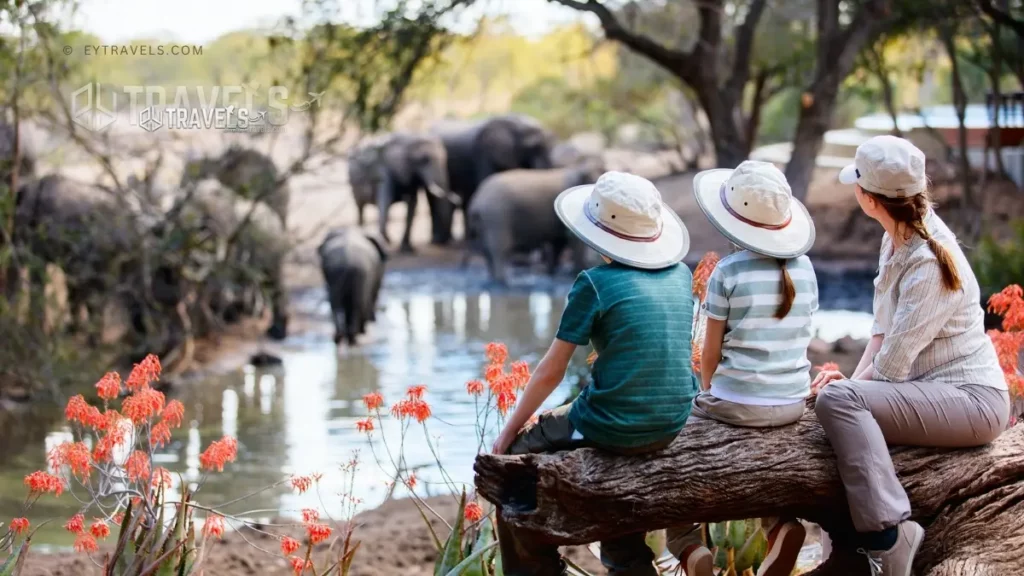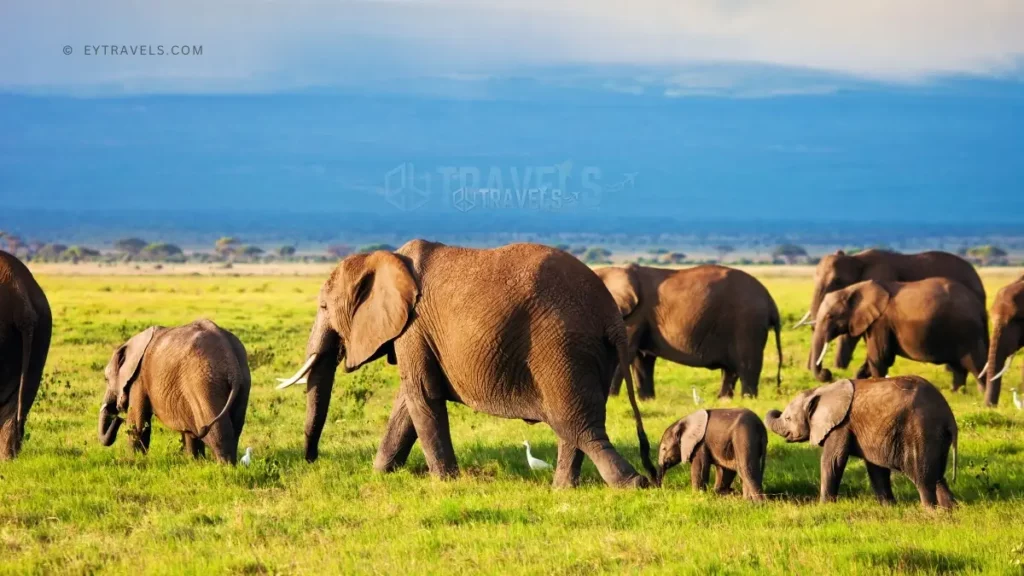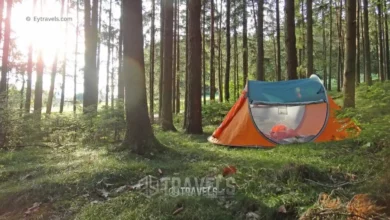Safari Planning 101: Your Ultimate Guide to an Unforgettable African Adventure
Get Ready to Roar: The Ultimate African Safari Planning Guide!
Few experiences are as exhilarating and unforgettable as a safari adventure in Africa. With its stunning wildlife, breathtaking landscapes, and rich cultural heritage, Africa offers something for every traveler. However, planning a safari can be a daunting task, especially if it's your first time. There are so many factors to consider, such as the best time to visit, which countries to visit, what to pack, and where to stay. Discover Safari Planning 101: The ultimate guide to crafting your dream African safari. Insider tips, top destinations, and expert advice await!
But don’t worry, in this post we will provide you with the ultimate guide to planning an unforgettable African safari adventure. We'll cover everything from choosing the right destination and safari type, to packing essentials and staying safe in the wild. So, whether you're an experienced traveler or a first-time safari-goer, read on to discover all you need to know to plan the ultimate African adventure.
Introduction to an African safari adventure
Embarking on an African safari adventure is a dream come true for many nature enthusiasts and wildlife lovers. It is a chance to immerse oneself in the breathtaking beauty of the African wilderness, witness awe-inspiring wildlife up close, and create memories that will last a lifetime.
Africa is a continent that boasts an incredible diversity of landscapes, from vast savannahs and lush rainforests to towering mountains and pristine coastlines. Each region offers its unique blend of flora and fauna, making it a paradise for nature enthusiasts.

The continent is home to the famous Big Five – lions, elephants, buffalos, leopards, and rhinos, which are a must-see for any safari-goer. However, the wildlife experience extends far beyond these iconic species. Giraffes gracefully roaming the plains, cheetahs sprinting through the grasslands, and hippos lazing in the waterways are just a few of the many incredible sightings that await.
As you plan your African safari adventure, it is important to consider the various factors that will contribute to an unforgettable experience. From choosing the right destination and time of year to selecting the best accommodation options and safari activities, there are numerous details to consider.
In this comprehensive guide, we will walk you through each step of the planning process, offering valuable insights and expert tips to ensure that your African safari adventure exceeds all expectations. Get ready to embark on a journey like no other, where the sights, sounds, and experiences of the African wilderness will leave an indelible mark on your heart and soul.
Choosing the best time to visit Africa
Choosing the best time to visit Africa is crucial in ensuring that you have an unforgettable safari experience. The continent is known for its diverse landscapes and wildlife, and the timing of your trip can greatly impact what you see and do during your adventure.
Africa experiences different seasons and climates throughout the year, so it is important to consider the weather patterns and wildlife migrations when planning your trip. The best time to visit Africa depends on the specific country or region you plan to explore.

For instance, if you are planning to visit East Africa, such as Kenya or Tanzania, the best time to witness the Great Migration of wildebeest and zebras in the Serengeti is typically between July and September. This is when the herds cross the Mara River, creating a spectacle of nature that is truly awe-inspiring. Additionally, the dry season during these months allows for better wildlife viewing as animals gather around water sources.
On the other hand, Southern Africa, including countries like South Africa, Botswana, and Zimbabwe, offers a different safari experience. The dry winter months from May to September are considered the best time to visit as the vegetation thins out, making it easier to spot wildlife in national parks such as Kruger or Chobe. Moreover, this period also coincides with the peak season for game drives and other outdoor activities.
It is important to note that while these periods are generally considered ideal, Africa's climate can be unpredictable, and wildlife behavior can vary. Therefore, it is advisable to do thorough research and consult with local experts or tour operators who have in-depth knowledge of the specific regions you plan to visit.
By carefully choosing the best time to visit Africa, you can maximize your chances of witnessing incredible wildlife encounters, breathtaking landscapes, and enjoying optimal weather conditions, all contributing to an unforgettable African adventure.
Deciding on your safari destination
Deciding on your safari destination is an exciting and crucial step in planning your African adventure. With so many incredible destinations to choose from, it's important to consider your interests, budget, and the type of wildlife and landscapes you hope to encounter.
One popular destination for safaris is Kenya, known for its diverse wildlife and iconic Maasai Mara National Reserve. Here, you can witness the Great Wildebeest Migration, where millions of wildebeest and other animals cross the Mara River in search of greener pastures. Kenya also offers opportunities to spot the Big Five – lions, elephants, rhinos, leopards, and buffalos – in their natural habitats.
Another top choice is Tanzania, home to the famous Serengeti National Park and the stunning Ngorongoro Crater. The Serengeti is renowned for its vast savannahs and an abundance of wildlife, including lions, cheetahs, and large herds of elephants. The Ngorongoro Crater, on the other hand, is a unique natural wonder with its collapsed volcano and a remarkable concentration of animals.
South Africa, with its world-class game reserves such as Kruger National Park, offers a blend of wildlife encounters and stunning landscapes. Here, you can embark on thrilling game drives to spot lions, rhinos, and giraffes, while also enjoying the breathtaking scenery of the African bushveld.
Other countries like Botswana, Zambia, and Zimbabwe also offer exceptional safari experiences. Botswana's Okavango Delta is a wildlife-rich oasis with stunning waterways and diverse ecosystems. Zambia's South Luangwa National Park is renowned for its walking safaris and incredible leopard sightings. Zimbabwe's Hwange National Park is home to vast elephant herds and offers opportunities for both game drives and walking safaris.
When deciding on a safari destination, consider factors such as the time of year, weather conditions, and the specific wildlife you want to see. Some destinations have different peak seasons for wildlife viewing or offer unique experiences, such as gorilla trekking in Uganda or Rwanda.
Ultimately, the choice of your safari destination depends on your preferences and the type of adventure you seek. Whether you're dreaming of witnessing the Great Migration, exploring the vast savannahs, or encountering rare species, Africa offers a myriad of options to create an unforgettable safari experience.
Understanding the different types of safari experiences
When planning your African safari adventure, it is crucial to understand the different types of safari experiences available to make the most of your trip. Africa offers a diverse range of safari options, each offering a unique and unforgettable experience.
Game Drives:
The most common and popular type of safari experience, game drives take you on thrilling expeditions through national parks and private reserves. Accompanied by experienced guides, you venture out in open 4×4 vehicles, providing excellent opportunities to spot the Big Five and other wildlife species in their natural habitats. The game drives typically take place during the early morning and late afternoon when animals are most active.
Walking Safaris:

For those seeking a more immersive and intimate experience, walking safaris are the way to go. Led by knowledgeable guides, you explore the wilderness on foot, allowing you to observe the intricate details of nature up close. Walking safaris provide a deeper connection with the environment, where you can learn about flora and fauna, track animal footprints, and appreciate the smaller wonders of the bush.
Canoe Safaris:
If you're looking for a unique perspective on wildlife, consider embarking on a canoe safari. Drifting along tranquil rivers and waterways, you can spot a variety of aquatic wildlife, including hippos, crocodiles, and an array of bird species. This serene experience offers a different dimension to your safari adventure, allowing you to appreciate the beauty of the African landscapes from a different vantage point.
Hot Air Balloon Safaris:
For a truly unforgettable and awe-inspiring experience, opt for a hot air balloon safari. As you soar above the African plains, you'll witness breathtaking panoramic views of the wildlife below and the stunning landscapes that stretch out before you. This serene and enchanting adventure provides a unique perspective and a chance to capture stunning photographs from the sky.
Cultural Safaris:
In addition to wildlife encounters, Africa is rich in vibrant cultures and fascinating traditions. Cultural safaris allow you to immerse yourself in the local communities, interact with indigenous tribes, and gain an understanding of their way of life. From visiting Maasai villages in Kenya to exploring the San Bushmen culture in Botswana, these experiences offer a deeper appreciation of Africa's diverse heritage.
Understanding the different types of safari experiences will help you tailor your itinerary to suit your preferences and interests. Whether you're seeking thrilling wildlife encounters, serene moments in nature, or cultural immersion, Africa has something to offer every adventurer. Embark on your safari journey with an open heart and mind, and get ready to create memories that will last a lifetime.
Selecting the right accommodations for your safari
Selecting the right accommodations for your safari is crucial in ensuring a comfortable and memorable experience. Africa offers a wide range of accommodation options, ranging from luxurious lodges and tented camps to budget-friendly guesthouses and camping sites. Consider the following factors when making your selection:
- Location: Choose an accommodation that is strategically located near the wildlife reserves or national parks you plan to visit. This will save you time on travel and maximize your game viewing opportunities.
- Comfort and Amenities: Decide on the level of comfort you desire during your safari. Luxury lodges offer spacious rooms, en-suite bathrooms, and high-end amenities such as swimming pools, spas, and gourmet dining options. On the other hand, tented camps provide a more immersive experience with comfortable beds, private bathrooms, and a closer connection to nature.
- Budget: Determine your budget and look for accommodations that fit within your financial constraints. Remember to consider the overall cost of your safari, including activities, park fees, and transportation, when setting your accommodation budget.
- Wildlife Experience: Some accommodations offer unique wildlife experiences such as treehouses or platforms overlooking watering holes, providing an opportunity to observe animals in their natural habitat from the comfort of your room.
- Eco-friendly Practices: If you are passionate about sustainable travel, choose accommodations that prioritize eco-friendly practices. Look for properties that implement responsible waste management, use renewable energy sources, and support local conservation efforts.
- Reviews and Recommendations: Before making a final decision, read reviews and seek recommendations from fellow travelers or reputable travel websites. Their experiences and insights can help you make an informed choice.
Remember that availability can be limited, especially during peak seasons, so it's advisable to book your accommodation well in advance. By selecting the right accommodations for your safari, you'll enhance your overall experience and create lasting memories of your African adventure.
Planning your safari itinerary
When it comes to planning your safari itinerary, there are several factors to consider to ensure you have an unforgettable African adventure.
- The first step is to research and decide on the specific countries and national parks you want to visit. Africa is vast and diverse, offering a myriad of wildlife-rich destinations such as Kenya, Tanzania, South Africa, Botswana, and more.
- Consider the time of year you plan to go on safari, as different seasons offer unique experiences. For example, the Great Migration in East Africa takes place from July to October, where millions of wildebeest and zebras migrate across the Serengeti plains. If witnessing this incredible spectacle is on your bucket list, plan your safari accordingly.
- Next, think about the duration of your safari. Some travelers opt for a shorter trip, focusing on one or two national parks, while others prefer a more extensive journey, exploring multiple destinations. Keep in mind that spending more time in each location allows for a deeper immersion into the wildlife, landscapes, and local culture.
While planning your itinerary, consider the activities and experiences you want to include. Game drives are a must-do and provide excellent opportunities to spot the Big Five (lion, elephant, buffalo, leopard, and rhinoceros), as well as other captivating wildlife. Additionally, many national parks offer walking safaris, boat cruises, hot air balloon rides, and cultural visits to local communities.

Another crucial aspect to consider is accommodation. African safaris offer a range of options, from luxury lodges and tented camps to budget-friendly campsites. Choose the type of accommodation that aligns with your preferences and budget, keeping in mind that some lodges provide exclusive access to private reserves or prime wildlife viewing areas.
Lastly, don't forget about the logistics of transportation. Depending on your chosen destinations, you may need to arrange domestic flights, transfers, or even hire a private guide and vehicle. Research reputable tour operators or travel agencies that specialize in safari planning to ensure a smooth and well-organized trip.
By carefully planning your safari itinerary, taking into account the destinations, timing, activities, accommodation, and logistics, you can create a personalized and unforgettable African adventure that exceeds all expectations. So grab your binoculars, camera, and sense of adventure, and get ready to embark on the safari of a lifetime.
Essential items to pack for your African adventure
When embarking on an African adventure, packing the right items can make all the difference in ensuring a comfortable and memorable experience. The diverse landscapes, wildlife encounters, and varying weather conditions in Africa necessitate careful consideration when selecting what to pack. Here are some essential items to include in your packing list:
- Lightweight and breathable clothing: Africa can be hot and humid, so pack lightweight and breathable clothing to stay cool and comfortable, especially during game drives and bushwalks. Opt for neutral-colored attire to blend in with the surroundings and avoid attracting insects.
- Comfortable walking shoes: With the opportunity for exploring national parks, trekking to see gorillas, or venturing into the wilderness, durable and comfortable walking shoes are a must. Choose closed-toe shoes with good arch support to protect your feet during long walks.
- Insect repellent and sunscreen: Protect yourself from mosquitos and the African sun by packing insect repellent and sunscreen with a high SPF. Mosquitos can transmit diseases like malaria, so it's crucial to take necessary precautions.
- Binoculars and camera: Capture incredible wildlife moments and enjoy up-close views of animals by bringing binoculars and a good camera. Whether it's spotting a lioness on the prowl or observing the intricate patterns on a giraffe's coat, these tools will enhance your safari experience.
- Hat and sunglasses: Shield yourself from the sun's rays by wearing a wide-brimmed hat and sunglasses. These will not only protect your face and eyes but also offer relief from the glare in open savannahs or desert landscapes.
- Power adapters and portable chargers: Ensure your electronics stay powered throughout your journey by packing the necessary power adapters and portable chargers. Africa has a variety of plug types, so research the specific countries you'll be visiting and pack accordingly.
- First aid kit and prescription medications: It's always wise to carry a basic first aid kit containing essentials such as band-aids, antiseptic ointment, and pain relievers. Additionally, if you have any prescription medications, make sure to bring an ample supply for the duration of your trip.
- Travel documents and copies: Don't forget to pack your passport, visas, and any other required travel documents. It's also advisable to keep copies of these documents in separate bags or digitally, in case of loss or theft.
Remember, packing light is key to a hassle-free journey, so prioritize essential items while considering the climate and activities you'll be engaging in. By being well-prepared, you can focus on immersing yourself in the breathtaking beauty and wildlife Africa has to offer.
Tips for staying safe and healthy during your safari
When embarking on an African safari, ensuring your safety and health should be a top priority. While the experience is undoubtedly thrilling and awe-inspiring, it is essential to be prepared and take necessary precautions. Here are some valuable tips to help you stay safe and healthy during your safari adventure.
- Research and choose a reputable tour operator: Before booking your safari, thoroughly research and select a well-established and reputable tour operator. Read reviews, check their safety measures, and ensure they have experienced guides who prioritize the well-being of their guests.
- Follow your guide's instructions: Your safari guide is your expert companion throughout the journey. Pay close attention to their instructions and advice regarding safety protocols, wildlife encounters, and camp rules. They possess valuable knowledge and experience, so trust their guidance implicitly.
- Keep a safe distance from wildlife: While the desire to get up close and personal with the wildlife may be tempting, always maintain a safe distance. Respect the animals' space and never approach them on foot unless instructed to do so by your guide. Remember, these are wild animals, and their behavior can be unpredictable.
- Protect yourself from mosquito bites: African countries may have a risk of mosquito-borne diseases such as malaria. Consult with your healthcare provider before the trip and take necessary precautions, such as using insect repellents, wearing long sleeves and pants, and sleeping under mosquito nets.
- Stay hydrated and follow dietary guidelines: Safaris can be physically demanding, and the African climate can be hot and arid. Drink plenty of water to stay hydrated throughout the day. Additionally, follow dietary guidelines provided by your safari camp, as certain food and water precautions may be necessary to avoid any stomach issues.
- Use sunscreen and wear appropriate clothing: Protect yourself from the harsh African sun by applying sunscreen with a high SPF and wearing a wide-brimmed hat, sunglasses, and lightweight, breathable clothing. This will not only safeguard your skin but also help regulate body temperature.
- Carry necessary medications and first aid supplies: It's wise to carry a small first aid kit with essential medications like painkillers, antihistamines, and any prescription drugs you require. Be aware of any allergies or health conditions you have and inform your guide about them for any emergency situations.
By following these tips, you can ensure a safe and healthy safari experience while creating unforgettable memories. Remember, your well-being is paramount, allowing you to fully immerse yourself in the beauty and wonder of Africa's incredible wildlife and landscapes.
Wildlife photography tips for capturing the best moments
Capturing the awe-inspiring moments of wildlife encounters is an essential part of any African safari adventure. Whether you are a seasoned photographer or a beginner armed with a smartphone, these wildlife photography tips will help you capture the best moments and create lasting memories.

- Pack the Right Equipment: To capture the intricate details of wildlife, it's essential to have the right gear. Bring a DSLR camera with a telephoto lens that allows you to zoom in on distant subjects. A sturdy tripod can also be beneficial for stability, especially during low-light conditions.
- Know Your Subjects: Familiarize yourself with the behavior and habits of the animals you'll encounter. This knowledge will help you anticipate their movements and capture those unique and captivating moments. Understanding their habitats and preferred locations can increase your chances of capturing rare sightings.
- Patience is Key: Wildlife photography requires patience. Sometimes, you might have to wait for hours to get the perfect shot. Settle in a hide or position yourself strategically near watering holes or feeding areas, and be prepared to wait for the right moment to unfold.
- Composition and Lighting: Pay attention to the composition of your photographs. Use the rule of thirds to create visually balanced images. Experiment with different angles and perspectives to bring out the essence of the wildlife. Additionally, try to shoot during the golden hours—early morning or late afternoon—when the light is softer and enhances the colors and textures of the surroundings.
- Capture Action: Wildlife is dynamic, and capturing animals in action can add a sense of energy to your photographs. Be ready to snap shots of animals running, hunting, or interacting with each other. Use continuous shooting mode or burst mode to capture a series of images in quick succession.
- Respect the Wildlife: Remember to prioritize the well-being and safety of the animals. Keep a respectful distance and avoid disturbing their natural behavior. Observe from a distance and use telephoto lenses to avoid intruding on their space.
- Be Prepared: Wildlife encounters can happen unexpectedly. Always keep your camera easily accessible and ready to shoot. Ensure you have spare batteries and memory cards to avoid missing out on any incredible sightings.
- Tell a Story: Let your photographs tell a story about the wildlife and their environment. Capture the interactions between different species, the beauty of the landscape, and the small details that make the experience unique. Aim for a variety of shots, including close-ups, wide angles, and environmental portraits.
Remember, wildlife photography is not just about capturing technically perfect images but also about embracing the wonder and beauty of the natural world. Be patient, be respectful, and let your passion for wildlife shine through your photographs.
Cultural etiquette and responsible tourism in Africa
When embarking on an African safari adventure, it is essential to familiarize yourself with the cultural etiquette and principles of responsible tourism. Africa is a continent rich in diversity, with each country boasting its unique traditions, customs, and beliefs. Respecting and understanding these cultural nuances is not only a sign of courtesy but also contributes to the sustainability and preservation of local communities and their heritage.
One of the fundamental aspects of cultural etiquette in Africa is to dress modestly and conservatively when visiting rural areas or religious sites. It is important to be mindful of local sensibilities and avoid wearing revealing clothing that may be deemed inappropriate or disrespectful. Adapting to local customs and traditions, such as removing shoes before entering someone's home or mosque, is another way to show respect for the local culture.
Engaging with the local communities in a responsible and sustainable manner is also crucial. Before your safari, consider researching and supporting local businesses, community-based tourism initiatives, and fair trade practices. This not only ensures that your tourism dollars directly benefit the local economy but also provides more authentic and immersive experiences for travelers.
Responsible tourism also extends to wildlife conservation and environmental preservation. It is imperative to adhere to the guidelines set by park authorities and your safari operator to minimize your impact on the natural habitats and wildlife. This includes refraining from littering, not disturbing or feeding animals, and respecting the designated wildlife viewing distances. By being a responsible tourist, you contribute to the long-term protection and conservation of Africa's unique ecosystems and wildlife.
Lastly, be open-minded and curious about learning from the local communities you encounter during your safari. Engage in meaningful conversations, ask questions, and embrace the opportunity to gain insights into African cultures and traditions. By fostering cultural exchange and understanding, you not only enrich your own travel experience but also promote mutual respect and appreciation between cultures.
In conclusion, practicing cultural etiquette and responsible tourism in Africa is an integral part of planning an unforgettable safari adventure. By respecting local customs, supporting local communities, and conserving the environment, you contribute to the sustainability and preservation of Africa's rich cultural heritage and diverse ecosystems. So, embrace the spirit of responsible travel and get ready for a truly transformative African experience.
Making the most of your safari experience: activities and excursions
When it comes to planning a safari, one of the most exciting aspects is deciding on the activities and excursions that will make your African adventure truly unforgettable. With a wide range of options available, it's important to carefully consider your interests and preferences to ensure you make the most of your safari experience.
One of the classic safari activities that should not be missed is game drives. Whether it's a thrilling early morning drive or a magical sunset safari, these guided tours provide the opportunity to spot the majestic Big Five – lions, elephants, buffalos, leopards, and rhinos – as well as a plethora of other fascinating wildlife species. The vast expanses of the African savannah come alive as you witness these incredible creatures in their natural habitat, creating memories that will last a lifetime.
For those seeking a more adventurous experience, walking safaris offer a unique opportunity to explore the African wilderness on foot. Accompanied by experienced guides, you can venture into the bush and learn about the intricate ecosystem, tracks of animals, and discover the smaller, often overlooked wonders of nature. Walking safaris allow for a deeper connection with the environment and a chance to truly immerse yourself in the sights, sounds, and scents of the African bush.
To add a touch of cultural immersion to your safari, consider visiting local communities and engaging in community-based tourism activities. This allows you to interact with the indigenous people, learn about their traditions, and gain a deeper understanding of their way of life. From traditional dances and crafts to sharing meals with local families, these experiences provide a unique perspective on the rich cultural heritage of Africa.
For those with a passion for wildlife conservation, participating in conservation activities can be a rewarding and fulfilling experience. Many safari lodges and camps offer opportunities to get involved in conservation efforts, such as participating in anti-poaching patrols, assisting with wildlife research, or even joining in habitat restoration projects. These activities not only contribute to the preservation of the African wildlife but also offer a chance to actively contribute to the future of these magnificent creatures.
No safari experience would be complete without taking the time to simply relax and soak in the breathtaking beauty of the African landscape. Whether it's enjoying a sundowner by a watering hole, indulging in a luxurious spa treatment overlooking the savannah, or simply unwinding in the comfort of your safari lodge's private deck, taking moments to pause and appreciate the natural wonders around you is an essential part of the safari experience.
Ultimately, the activities and excursions you choose for your safari will depend on your personal interests and the destinations you visit. By carefully selecting a combination of game drives, walking safaris, cultural interactions, conservation activities, and moments of relaxation, you can create a safari experience that is tailored to your preferences and ensures an unforgettable adventure in the heart of Africa.
Budgeting and cost considerations for an African safari
Embarking on an African safari is an exciting and unforgettable adventure. However, it's crucial to carefully plan and budget for this once-in-a-lifetime experience. Understanding the cost considerations associated with an African safari will help you make informed decisions and ensure a smooth and enjoyable journey.
First and foremost, it's important to determine your budget for the safari. This will help you narrow down your options and avoid any financial surprises along the way. Consider factors such as accommodation, transportation, meals, park fees, activities, and any additional expenses like visas or travel insurance.
Accommodation choices range from luxury lodges and tented camps to more budget-friendly options such as guesthouses or camping sites. Keep in mind that the level of comfort and amenities provided will affect the overall cost. Research different accommodations and find the right balance between your budget and desired experience.
Transportation is another significant aspect of your safari budget. Depending on the destination and the type of safari you choose, transportation can vary from self-drive options to guided tours or even flying between parks. Each option comes with its own price tag, so weigh the pros and cons to determine which best suits your preferences and budget.
Meals are often included in safari packages, but it's important to clarify this beforehand. If meals are not included, factor in the cost of dining out or purchasing groceries if you opt for self-catering accommodations. Additionally, consider any dietary requirements or preferences that may impact your meal choices and budget accordingly.
Park fees are an essential consideration as they contribute to wildlife conservation efforts and help maintain the national parks and reserves. Research the specific fees for each park or reserve you plan to visit and incorporate them into your budget. Some parks offer discounted rates for multiple-day visits, so take advantage of these opportunities if they align with your itinerary.
Activities and additional experiences can enhance your safari adventure but may come with extra costs. Game drives, guided walks, hot air balloon rides, and cultural excursions are just a few examples of the diverse activities available. Prioritize the activities that interest you most and allocate a portion of your budget accordingly.
Lastly, don't forget to account for miscellaneous expenses such as visas, travel insurance, tips, and souvenirs. These smaller costs can add up, so it's wise to include them in your budget planning.
By considering all these budgeting and cost considerations, you can ensure a well-planned and financially manageable African safari adventure. Remember to be flexible and adaptable as unexpected expenses may arise. With proper preparation, you'll be ready to embark on an unforgettable journey through the breathtaking landscapes and abundant wildlife of Africa.
Choosing a reputable safari tour operator or guide
Choosing a reputable safari tour operator or guide is crucial for ensuring a safe and unforgettable African adventure. With so many options available, it can be overwhelming to make the right choice. However, taking the time to research and select a reliable operator will greatly enhance your safari experience.
First and foremost, look for tour operators or guides that are licensed and registered with the appropriate authorities. This will give you peace of mind knowing that they adhere to industry standards and regulations. You can usually find this information on their website or by contacting them directly.
One of the best ways to gauge the reputation of a safari operator is by reading reviews and testimonials from previous clients. Check online platforms, travel forums, and social media groups to see what others have to say about their experiences. Look for feedback on the quality of guides, the condition of vehicles, the level of customer service, and overall satisfaction.
Another important factor to consider is the level of expertise and knowledge possessed by the guides. A knowledgeable guide can greatly enhance your safari experience by providing interesting insights, identifying wildlife, and ensuring your safety. Look for guides who have extensive experience in the areas you plan to visit and who are passionate about wildlife conservation.
Additionally, consider the types of safaris and accommodations offered by the tour operator. Do they cater to your preferences and budget? Are they able to provide a customized itinerary that suits your interests? Make sure to inquire about the safari vehicles used, as comfort and safety during long drives are essential.
It is also worth looking into the company's commitment to sustainability and responsible tourism practices. An operator that prioritizes conservation and community involvement can make a positive impact on the local environment and communities.
Lastly, don't hesitate to reach out to the tour operator or guide directly to ask any questions or address any concerns you may have. A reputable operator will be responsive, transparent, and happy to provide you with all the necessary information.
By choosing a reputable safari tour operator or guide, you can ensure that your African adventure is not only unforgettable but also ethically and responsibly conducted. So take the time to do your research, read reviews, and make an informed decision. Your safari experience will be all the more rewarding for it.
Preparing for the unexpected: travel insurance and emergency plans
When embarking on an African safari adventure, it is crucial to prepare for the unexpected. While you may have meticulously planned every aspect of your trip, unforeseen circumstances can still arise. That is why having comprehensive travel insurance and emergency plans in place is essential to ensure peace of mind and a smooth journey.
Travel insurance provides you with financial protection against a range of potential risks, including trip cancellations, medical emergencies, lost luggage, and even evacuation from remote locations. It is vital to carefully review the coverage options and policy details offered by different insurance providers to ensure they align with your specific needs and the activities you plan to undertake during your safari.
When considering travel insurance, it is crucial to assess the level of medical coverage provided. African destinations often feature remote and wild landscapes, and access to medical facilities may be limited. Therefore, ensuring that your insurance covers medical emergencies, including air ambulance services if necessary, can be a lifesaver in critical situations.
In addition to travel insurance, having a well-thought-out emergency plan is equally important. Research local medical facilities and emergency services available in the areas you will be visiting. Save emergency contact numbers, including those of your embassy or consulate, local hospitals, and tour operators, both on your phone and in a physical copy. It is also advisable to share these details with a trusted family member or friend back home.
Furthermore, consider investing in a reliable communication device, such as a satellite phone or a portable Wi-Fi hotspot, especially if you plan to venture into more remote regions with limited cellular coverage. This will enable you to stay connected and seek assistance if needed.
Remember to carry copies of important documents like your passport, travel insurance policy, and any necessary visas. Having digital copies stored securely online and physical copies in separate locations, such as your luggage and accommodations, can provide an extra layer of protection against loss or theft.
By taking the time to prepare for the unexpected with travel insurance and emergency plans, you can focus on immersing yourself in the awe-inspiring beauty of Africa's wildlife and landscapes, knowing that you are well-equipped to handle any unforeseen circumstances that may arise during your safari adventure.
Final thoughts and tips for an unforgettable African adventure
As you come to the end of this ultimate guide to planning an unforgettable African adventure, it's important to take a moment to reflect on what you've learned and consider some final thoughts and tips that will enhance your safari experience.
First and foremost, embrace the spirit of adventure. Africa is a continent of diverse landscapes, captivating wildlife, and vibrant cultures. Be open to new experiences and immerse yourself in the beauty and wonder that surrounds you. Keep in mind that safaris can be unpredictable, and it's often the unexpected moments that become the most cherished memories.
Next, prioritize your safety and well-being. While safaris offer incredible encounters with wildlife, it's essential to follow the guidance of your experienced guides and adhere to the rules and regulations of the national parks or reserves you visit. Listen to their instructions, maintain a safe distance from animals, and never attempt to approach or feed them.
Pack wisely for your African adventure. Remember to bring comfortable clothing suitable for both warm days and cooler evenings. Opt for neutral colors to blend in with the natural environment and don't forget essentials such as sunscreen, insect repellent, and a good pair of binoculars to fully appreciate the wildlife sightings.
Photography enthusiasts should ensure they have the necessary equipment and spare batteries to capture the breathtaking moments they encounter. Remember to respect the wildlife and their habitats by observing from a distance, without disturbing their natural behavior.
Lastly, engage with the local communities and contribute to sustainable tourism. Respect the traditions and customs of the people you encounter, support local businesses, and consider volunteering or donating to conservation projects that are working tirelessly to protect Africa's unique biodiversity.
By following these final thoughts and tips, you are well on your way to creating lasting memories and having an unforgettable African adventure. Prepare to be amazed, inspired, and transformed by the magic of the African wilderness. Safaris are not just journeys; they are life-changing experiences that will leave an indelible mark on your soul. So, embrace the wild, embrace the unknown, and embark on the adventure of a lifetime.
We hope you found our ultimate guide to planning a safari adventure in Africa helpful and inspiring. Planning a safari can be a daunting task, but with the tips and information provided in this article, you can feel confident in creating an unforgettable experience. From choosing the right destination and accommodations to packing essentials and understanding wildlife etiquette, we've covered it all. Now it's time to start planning your dream safari and embark on a journey that will leave you with lifelong memories. Get ready to witness the breathtaking beauty of African wildlife in its natural habitat, and may your adventure be filled with awe, wonder, and a deep appreciation for the incredible diversity of our planet. Safe travels!







???? Planning your dream African safari adventure? Look no further! ???????? Insider tips, top destinations, and expert advice await! Follow for more travel inspiration and like if you’re ready for an unforgettable journey! Check out this ultimate guide from EyTravels:
https://www.eytravels.com/safari-planning-101/
.
#eytravels #safari #AfricanAdventure #TravelTips #Wildlife #ExploreAfrica #BucketList